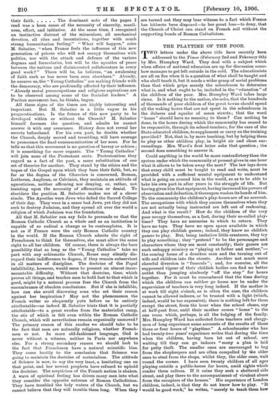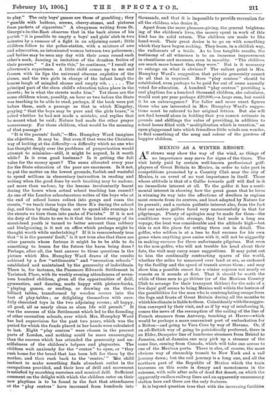THE PLAYTIME OF THE POOR. T WO letters under the above
title have recently been addressed to the Times (February 2nd and February 6th) by Mrs. Humphry Ward. They deal with a subject which when affairs of national education are up for discussion some- how manages to get left outside in the cold. The educationists are all on fire when it is a question of what shall be taught and who shall teach it, but it needs a wider grasp of social problems than that which grips merely the schoolroom to determine what is, and what ought to be, included in the " education " of the children of the poor. Mrs. Humphry Ward takes large views. Is it nothing to the nation, she asks, that the hundreds of thousands of poor children of the great towns should spend all the waking hours that are not spent in the schoolroom in the dulness and squalor of mean streets ; that the word "home" should have no meaning to them P Can nothing be done, in the hours during which the community has ceased to be responsible, through its school-teachers, for the care of the State-educated children, to supplement or carry on the training provided P Not, that is, by more teaching, but by helping them to play as other children play, in bright air and clean sur- roundings. Mrs. Ward's first letter asks that question ; the second does something to answer it.
Could anything in the world be more contradictory than the system under which the community at present gives in one hour what it allows to be taken away the next P The law lays down that every child must be taught to read and write, must be provided with a sufficient mental equipment to understand what is going on around him in the world, so as to be able to take his own part in after years in the struggle of life. Bat having given him that equipment, having increased his powers of observation and deduction, it thereupon washes its hands of him. To the community the children's play-hours are of no account. The occupations with which they amuse themselves when they are not actually being instructed are left out of reckoning. And what is the result ? How do the children of the very poor occupy themselves, as a fact, during their so-called play- time ? They have no nurseries to which to return. They have no toys. They have no open space available in which they can play childish games; indeed, they know no childish games to play. But, being imitative little creatures, they try to play something; they " pretend " to be the personages and characters whom they see most constantly; their games are such unhappy mimicry as "playing at father and mother,"— the coming home of a drunken man and the turning out of wife and children into the streets. Another not much more cheerful diversion is "funerals "; and, for exercise, all the suppressed vigour of their childish bodies can find no better outlet than jumping aimlessly "off the step" for hours together. For it must be remembered that the time during which the children can neither go home nor be under the supervisioir of teachers is very long indeed. If the mother is at work till eight o'clock, as is often the case, the children cannot be allowed indoors, or be trusted with a light (which, indeed, would be too expensive); there is nothing left for them except the street, from the hour when the school closes, say at half-past four, until their mother comes " home " to the one room which, perhaps, is all the lodging of the family. Mrs. Humphry Ward has collected from teachers and clergy- men of long experience some accounts of the results of those three or four hours of " playtime." A schoolmaster who has had twenty-two years' experience writes that during the time when the children, having been let out of school, are waiting till they can go indoors " many a plan is laid for petty theft. The smaller ones are encouraged to beg from the shopkeepers and are often compelled by the older ones to steal from the shops, whilst they, the older ones, wait round the corner. I have seen twenty children of all ages playing outside a public-house for hours, amid sights which render them callous. If it rains they seek a sheltered side street, and play there to the accompaniment of virulent abuse from the occupiers of the houses." His experience of London children, indeed, is that they do not know how to play. "It would be good work," he writes, "merely to teach them how
to play." The only boys' games are those of gambling ; they
gamble with buttons, screws, cherry-stones, and pictures from packets of cigarettes." A clergyman writing. from St. George's-in-the-East observes that • in the -back sluins of his parish " it is possible to empty a boys' and girls' club in two minutes by a rumour of a fight in an adjoining court; little children follow to the police-station, with a mixture of awe and admiration, an intoxicated woman between two policemen; and babies may be seen any day with their arms round each other's neck, dancing in imitation of the drunken frolics of their parents." " AS I write this," he continues, " I recall my afternoon's experience. A little child comes up to me and frames with its lips the universal obscene expletive of the slums, and -the two girls in charge of the infant laugh the
hoarse laugh of mingled shame and empty wit • The principal part of the slum child's education takes place in the streets ; he is what the streets make him." Yet those are the same children whom, possibly, an hour or two before the State was teaching to be able to read, perhaps, if the book were put before them, such a passage as that in which Kingsley, praying " that the boys may be pure and the girls brave," is asked whether he had not made a mistake, and replies that he meant what he said; Nature had made the other prayer unnecessary. For those children, what would be the meaning of that passage P "It is the parents' fault,"—Mrs. Humphry Ward imagines the objection. It may be. But even if that were the Christian way of looking at the difficulty—a difficulty which no one who has thought deeply over the problems of pauperisation would attempt to minimise—still, it might be argued, Is it worth while ? Is it even good business? Is it getting the full value for the money spent? The sums allocated every year for the State education of the poor are enormous. Is it not, to put the matter on the lowest grounds, foolish and wasteful to spend millions in elementary instruction in reading and writing when the good done by such teaching may be undone, and more than undone, by the lessons involuntarily learnt during the hours when actual school teaching has ceased ? As one of the London schoolmasters writes of the boys who at the end of school hours collect into gangs and roam the streets, " we teach these boys the three R's during the school day, and then by sending them out to spend idle evenings in the streets we turn them into packs of Pariahs." If it is not the duty of the State to see to it that the latent energy of its street-bred youth is turned to better account than robbery and bludgeoning, is it not an office which perhaps might be thought worth while undertaking ? If it is remorselessly true that " it is the parents' fault," is it not true also that there are other parents whose fortune it might be to be able to do something to lessen for the future the harm being done ? Perhaps, after all, the best answer to those questions is the picture which Mrs. Humphry Ward draws of the results achieved by a few "settlements" and "recreation schools" established and maintained by the generosity of individuals. There is, for instance, the Passmore Edwards Settlement in Tavistock Place, with its weekly evening attendances of seven- teen hundred children, given all the opportunities of drill, gymnastics, and dancing, made happy with picture-books, " playing games, or reading, or drawing on the three billiard tables, transformed by wooden covers into the best of play-tables ; or delighting themselves with care- fully cherished toys in the two adjoining rooms ; all happy, all good, all as nearly clean as slum life will permit." It was the success of this Settlement which led to the founding of other recreation schools, over which Mrs. Humphry Ward has had supervision for the past two years, which was the period for which the funds placed in her hands were calculated to last. Eight " play centres " were chosen in the poorest parts of London, and nothing could be more encouraging than the success which has attended the generosity and un- selfishness of the children's helpers and playmates. The children wait anxiously for the "centre" to open, or "they rush home for the bread that has been left for them by the mother, and then rush back to the ' centre.' " %he child instinct to make something finds abundant outlet in the occupations provided, and their love of drill and movement is satisfied by marching exercises and musical drill. Sufficient comment on the delight with which the children enter on their new playtime is to be found in the fact that attendances at the "play centres" have increased from hundreds into
thousands, and that it is impossible to provide recreation for all the children who desire it.
Apart from the mere pleasure-giving, the general brighten. ing of the children's lives, the money spent in work of this kind has its solid return. The children are made to like hand-work. Their great desire is to go on with something which they have begun making. They learn, in a childish way, the rudiments of a trade. As to leas tangible results, the testimony of all witnesses is to an immense improvement in cleanliness and manners, even in morality. " The children are much more honest than they were." But is it necessary to enlarge on what is obvious? The salient point is Mrs. Humphry Ward's suggestion that private generosity cannot do all that is required. More "play centres" should be established, even perhaps to be paid for out of sums annually voted for education. A hundred "play centres" providing a real playtime for a hundred thousand children, she calculates, would cost per year perhaps 220,000,—a large sum, but would it be an extravagance ? For fuller and more exact figures those who are interested in Mrs. Humphry Ward's sugges- tions must be referred to her original letters. But she will not find herself alone in holding that you cannot estimate in pounds and shillings the value of providing, in addition to school hours filled with "multiplication which is vexation," an open playground into which friendless little minds can wander, to find something of the song and colour of the gardens of happier children.











































 Previous page
Previous page